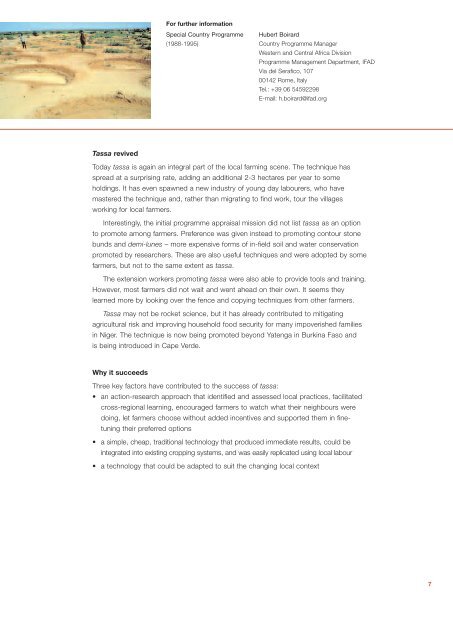Community-based natural resource management - International ...
Community-based natural resource management - International ...
Community-based natural resource management - International ...
You also want an ePaper? Increase the reach of your titles
YUMPU automatically turns print PDFs into web optimized ePapers that Google loves.
Tassa revived<br />
Today tassa is again an integral part of the local farming scene. The technique has<br />
spread at a surprising rate, adding an additional 2-3 hectares per year to some<br />
holdings. It has even spawned a new industry of young day labourers, who have<br />
mastered the technique and, rather than migrating to find work, tour the villages<br />
working for local farmers.<br />
Interestingly, the initial programme appraisal mission did not list tassa as an option<br />
to promote among farmers. Preference was given instead to promoting contour stone<br />
bunds and demi-lunes – more expensive forms of in-field soil and water conservation<br />
promoted by researchers. These are also useful techniques and were adopted by some<br />
farmers, but not to the same extent as tassa.<br />
The extension workers promoting tassa were also able to provide tools and training.<br />
However, most farmers did not wait and went ahead on their own. It seems they<br />
learned more by looking over the fence and copying techniques from other farmers.<br />
Tassa may not be rocket science, but it has already contributed to mitigating<br />
agricultural risk and improving household food security for many impoverished families<br />
in Niger. The technique is now being promoted beyond Yatenga in Burkina Faso and<br />
is being introduced in Cape Verde.<br />
Why it succeeds<br />
For further information<br />
Special Country Programme<br />
(1988-1995)<br />
Hubert Boirard<br />
Country Programme Manager<br />
Western and Central Africa Division<br />
Programme Management Department, IFAD<br />
Via del Serafico, 107<br />
00142 Rome, Italy<br />
Tel.: +39 06 54592298<br />
E-mail: h.boirard@ifad.org<br />
Three key factors have contributed to the success of tassa:<br />
• an action-research approach that identified and assessed local practices, facilitated<br />
cross-regional learning, encouraged farmers to watch what their neighbours were<br />
doing, let farmers choose without added incentives and supported them in finetuning<br />
their preferred options<br />
• a simple, cheap, traditional technology that produced immediate results, could be<br />
integrated into existing cropping systems, and was easily replicated using local labour<br />
• a technology that could be adapted to suit the changing local context<br />
7

















